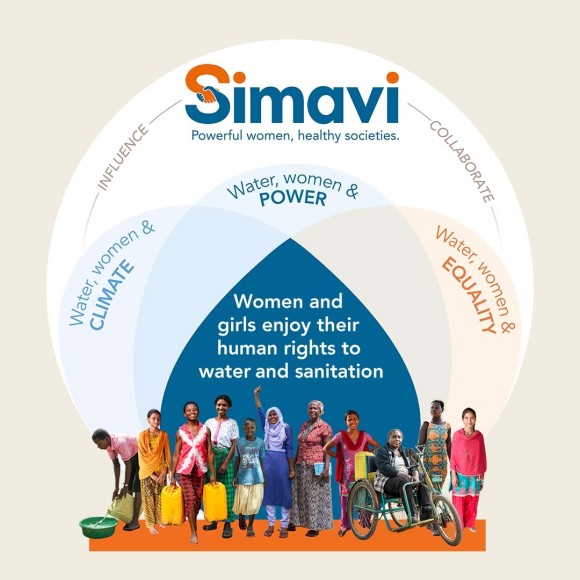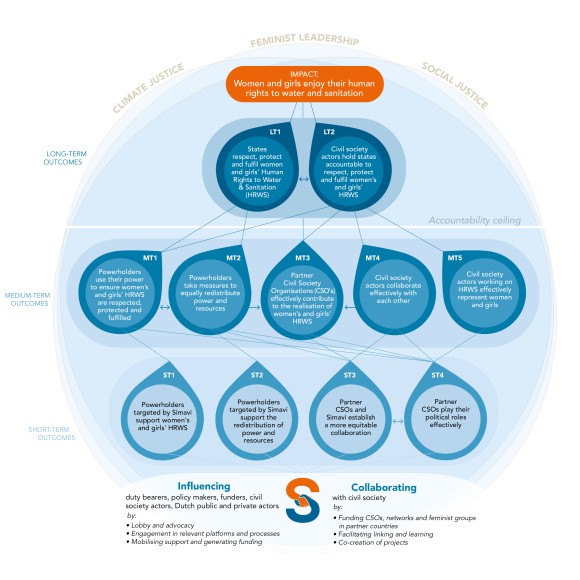Women and girls enjoying their rights to water and sanitation: Simavi's Theory of Change
Simavi’s mission is simple and at the same time very ambitious. We fight for equality and climate justice, and for women and girls to overcome barriers and claim their human rights to water and sanitation. Our Theory of Change guides us towards our goal.
At Simavi we want all our activities to contribute to our ultimate goal: a world in which all women and girls can enjoy their human rights to water and sanitation. We focus on women and girls because they are hit hardest by climate change and inadequate access to water and sanitation. At the same time, women are often excluded from decision-making processes. We strongly believe that not only women and girls themselves, but society as a whole will benefit if women and girls have equal opportunities.

What role do we want to play?
We believe that states are ultimately responsible to realise the human rights to water and sanitation. At the same time, we see it as the role of civil society to hold states accountable to the people and communities they serve. We believe civil society, women and girls, and their communities understand best what is needed in their country or community. We want all stakeholders – civil society, private sector and governmental organisations – to work together towards system change so long-term sustainability is guaranteed.
That is why Simavi does not see it as its end-goal to provide communities with water and sanitation services directly. We see it as our role to support civil society, women and girls, and their communities to claim their rights. For example by supporting influencing activities or in gathering evidence to support the claims of women and girls and commyunity-based organisations. We work to overcome gender inequality, amongst others by ensuring women and girls take part in decision-making on water and sanitation and by ensuring their needs are being considered.
What is our Theory of Change?
In 2021 Simavi developed a new Theory of Change (ToC). Our ToC helps us to ensure focus and describes how our key strategies contribute to our ultimate goal. Two mutually reinforcing strategies form the core of our work.
The first strategy is influencing. With like-minded organisations we influence local officials, policymakers, funders, civil society actors and private actors to take responsibility for women and girls’ rights to water and sanitation. We want them to own their roles and responsibilities. We want to challenge existing power imbalances. And we want to make sure that access to water is not merely seen as a technical problem but as a human rights issue that is related to other global problems, such as climate change and gender inequality.
The second strategy is collaboration. We collaborate with civil society organisations, such as community groups and NGOs, to strengthen their efficiency and leadership in achieving human rights to water and sanitation for women and girls. We do this through funding and supporting these organisations, networks, movements and feminist groups. We want to enable them to work and advocate more effectively, strengthening knowledge, skills, data collection and collaboration. And we want them to shift the power towards women and girls and amplify their voices.

In our Theory of Change, we identify four levels of change: short-term outcomes, mid-term outcomes, long-term outcomes and impact, which is the ultimate goal of our work and the combined result of the long-term outcomes that represent a broader change in the system.
How do we measure our progress?
The Theory of Change helps us to stay focused on our work. All our activities should contribute to achieving our ultimate goal. We aim to design our activities such as our advocacy work and the programmes we work on with partner organisations in Africa and Asia, in line with our ToC.
To achieve structural impact, Simavi’s approach is to address financial, institutional, environmental, technological and social sustainability (FIETS). We also make use of gender equality and social inclusion (GESI) tools to achieve our goals
To measure and showcase how programmes contribute to our ultimate goal, we developed indicators that are aligned with each of the outcomes in our ToC. Where possible we align these to the Human Rights framework or the sustainable development goals (SDG) and targets. To inform these indicators we collect all sorts of evidence from our activities and programmes, through surveys, mobile tools, interviews or feedback from stakeholders and other means. Where possible we make use of established tools.
For example, when evaluating sanitation services we follow the Human Rights’ AAAQ framework which stands for availability, accessibility, acceptability and quality of services. To collect this information we interview stakeholders, including women and girls, or we have external evaluators collect information against international standards. In our Impact Report, we bring this information together, using both quantitative data to measure progress and case studies to illustrate the actual impact on individuals.
How do we increase our impact?
We continually work to improve our impact. We make use of a variety of evidence, from our monitoring systems, evaluations and consultations with key stakeholders, to inform programmes and our lobby and advocacy work. And we invest in learning during the programme cycle, with stakeholders, and partner organisations, within specific areas and between countries. We are open to feedback on our goals and ways of working. Shifting the power is at the core of our strategy: shifting leadership to our partners and the women and girls themselves. For us, feminist leadership is about mutual respect, working and learning together with an open mind.
Long-term outcomes, which ultimately lead to all women and girls being able to enjoy their human rights to water and sanitation, are placed above the accountability ceiling in our Theory of Change. This is because Simavi is only one of many players that contribute to these outcomes. By cooperating with and influencing other stakeholders we try to maximise our impact on this level. Always with our ultimate goal in mind: making sure that all women and girls enjoy their human rights to water and sanitation.


